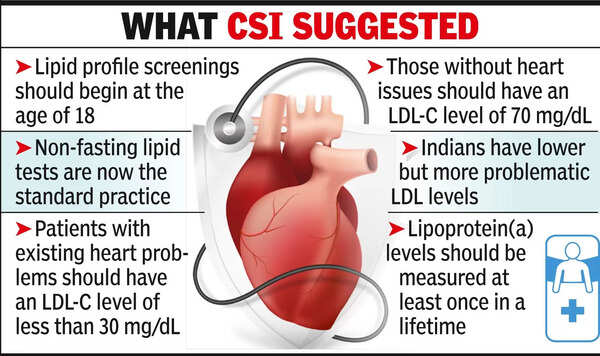- News
- City News
- nagpur News
- City doctors welcome CSI’s new lipid profile guidelines
Trending
City doctors welcome CSI’s new lipid profile guidelines

These updated guidelines come in response to India’s high rate of dyslipidemia and its unique lipid profile, focusing on early detection and lifestyle changes to combat cardiovascular diseases.In Nagpur, cardiologists applauded these changes, emphasizing the importance of tailored healthcare approaches for the Indian population.

Cardiothoracic surgeon Dr Anand Sancheti highlighted the necessity of these new guidelines. “The Indian population has distinct cardiovascular risk factors compared to western countries. Early screening and non-fasting lipid measurements will enable us to identify at-risk individuals sooner and implement necessary lifestyle interventions. This is a crucial step in curbing the rising incidence of heart disease in our country,” he said.
Senior cardiologist Dr Aziz Khan said, “Our lipid profiles often present differently, and conventional screening methods may not capture all at-risk patients. The new CSI guidelines address these discrepancies by promoting non-fasting lipid profiles, making the process convenient and potentially more accurate for our population.
Dr Shantanu Sengupta also welcomed the move, stressing benefits of non-fasting lipid profile testing. “Non-fasting tests are patient-friendly and can be easily incorporated into routine health check-ups. Although Indians typically have lower Low-Density Lipoproteins (LDL) levels than the global population, these LDLs can be more problematic. For those with heart problems, the target LDL should be less than 30 for secondary prevention, while those without heart issues should aim for an LDL level of 70,” he said.
“Additionally, checking Lipoprotein(a) levels once in a lifetime can be a crucial part of the screening process. It’s also important to consider the role of direct LDL measurements, which should be done after consulting a doctor to get a more accurate assessment of heart disease risk,” Sengupta added.
Dr Amar Amale, president-elect of CSI Nagpur, pointed out the significance of targeting high-risk patients with aggressive LDL-C goals. “These new guidelines will help us set and achieve lower LDL-C targets for such patients, ultimately reducing the burden of heart disease in India,” he noted.
Dr Ameya Beedkar emphasized the role of lifestyle changes in managing dyslipidemia. “Early detection through regular lipid screenings allows for timely interventions, primarily through lifestyle modifications. Educating patients about the importance of diet and exercise in managing their cholesterol levels is vital for long-term heart health,” he explained.
We also published the following articles recently
Besides lowering the risk of cardiovascular diseases, surprising health benefits of regular blood donation
Discover the benefits of donating blood, including improved heart health and emotional well-being. Learn about the myths surrounding blood donation and how it can save multiple lives. Find out about the mini health check-up process and the potential detoxification effects of giving blood.
Discover the benefits of donating blood, including improved heart health and emotional well-being. Learn about the myths surrounding blood donation and how it can save multiple lives. Find out about the mini health check-up process and the potential detoxification effects of giving blood.
This home test can reveal the risk of heart attack in five minutes
Discover how a simple home test could alert you to your risk of a heart attack within minutes. Researchers have developed a 14-question algorithm to identify individuals with significant coronary atherosclerosis. Learn more about this innovative screening tool for cardiovascular disease.
Discover how a simple home test could alert you to your risk of a heart attack within minutes. Researchers have developed a 14-question algorithm to identify individuals with significant coronary atherosclerosis. Learn more about this innovative screening tool for cardiovascular disease.
Preventive measures for respiratory diseases during monsoon
Learn how to protect yourself from respiratory diseases during the monsoon season with these preventive measures. Get vaccinated, practice good hygiene, use masks, and keep your environment clean. Stay hydrated, monitor air quality, and boost your immunity to reduce the risk of illness. Follow these tips for a healthy monsoon season.
Learn how to protect yourself from respiratory diseases during the monsoon season with these preventive measures. Get vaccinated, practice good hygiene, use masks, and keep your environment clean. Stay hydrated, monitor air quality, and boost your immunity to reduce the risk of illness. Follow these tips for a healthy monsoon season.
End of Article
FOLLOW US ON SOCIAL MEDIA











